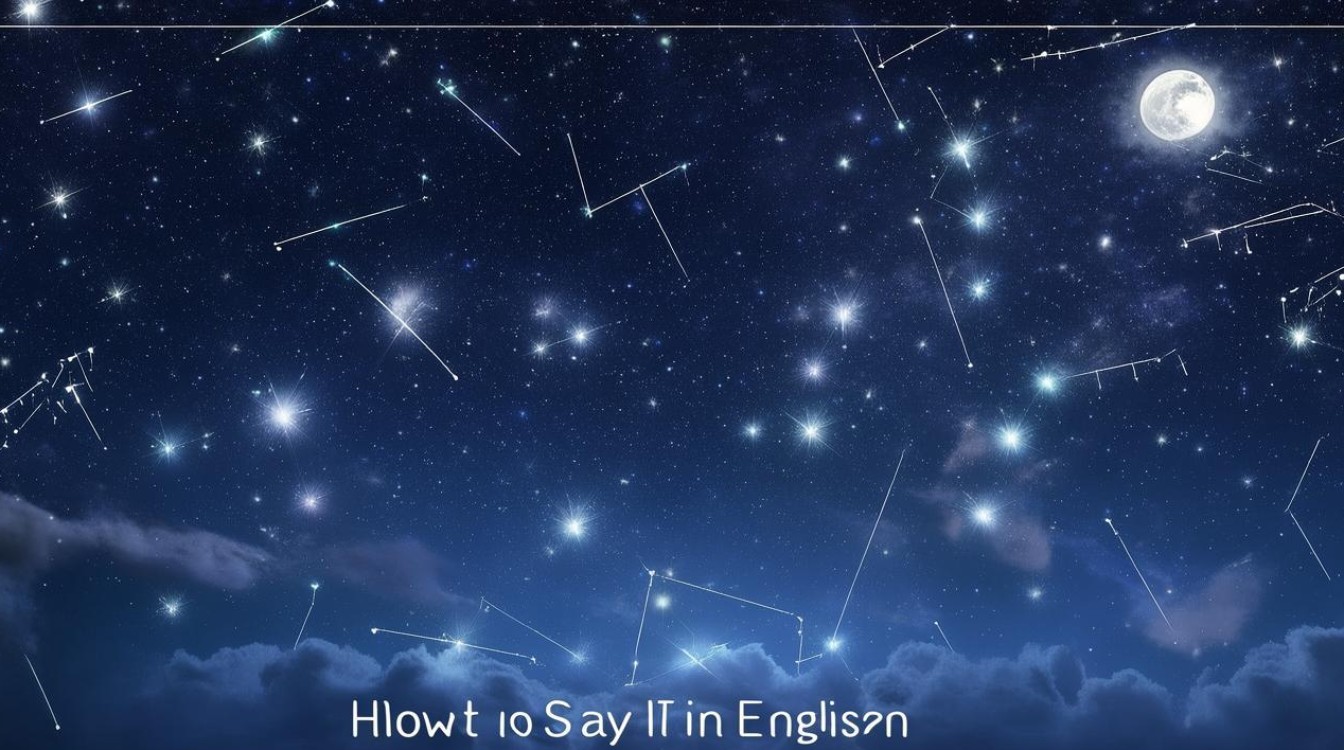Learning English vocabulary is like exploring a vast universe—each word is a tiny star, shining with its own meaning and usage. Among these, the word "star" itself is fascinating, not just as a celestial body but also in its various contexts. Let’s dive into how to say "星星" in English, its related terms, and how to use them naturally.

The Basics: "Star" in English
The direct translation of "星星" is "star." This word is simple yet versatile, appearing in everyday conversations, literature, and even idioms. Here’s how to pronounce it:
- Star /stɑːr/ (British English) or /stɑːr/ (American English).
Example sentences:
- "Look at the bright star in the sky!"
- "She drew a five-pointed star on the paper."
Types of Stars in English
While "star" is the general term, English has specific words for different kinds of stars or star-related phenomena:
-
Shooting star – A meteor streaking across the sky.
"Make a wish when you see a shooting star!"
-
Morning star / Evening star – Refers to Venus when visible at dawn or dusk.
"The morning star shone brightly before sunrise."
-
North Star (Polaris) – The star nearly aligned with Earth’s northern axis.
"Sailors used the North Star for navigation."
-
Binary star – A system of two stars orbiting each other.

"Scientists discovered a new binary star system."
-
Superstar – A highly famous person (metaphorical use).
"He became a superstar after his latest movie."
Idioms and Expressions with "Star"
English loves using "star" metaphorically. Here are some common phrases:
-
See stars – To feel dizzy or see flashes of light, often after a hit.
"The boxer saw stars after the punch."
-
Star-crossed lovers – Lovers doomed by fate (from Shakespeare).
"Romeo and Juliet are the ultimate star-crossed lovers."
-
Reach for the stars – To aim for ambitious goals.
"Her parents encouraged her to reach for the stars."

-
Born under a lucky star – To be naturally fortunate.
"He always wins contests—must’ve been born under a lucky star."
Astronomy vs. Pop Culture
The word "star" bridges science and daily life. In astronomy, it’s a celestial body, while in pop culture, it symbolizes fame or excellence. For example:
- Astronomy: "The telescope captured images of distant stars."
- Entertainment: "She’s the star of the new TV series."
This dual meaning makes "star" a rich word for learners.
How to Remember "Star" and Related Terms
To memorize these words, try these methods:
- Visual Association – Picture a starry sky when you hear "star."
- Use in Sentences – Practice with examples like those above.
- Flashcards – Write "star" on one side and its meanings on the other.
- Watch and Listen – Pay attention to how native speakers use "star" in movies or songs.
Common Mistakes to Avoid
Learners sometimes confuse "star" with similar-sounding words:
-
Stare (/steər/) – To look fixedly.
- Incorrect: "She gave me a star."
- Correct: "She gave me a stare."
-
Stair (/steər/) – A step in a staircase.
- Incorrect: "He tripped on a star."
- Correct: "He tripped on a stair."
Context is key—practice helps avoid these mix-ups.
Expanding Vocabulary: Synonyms and Related Words
To sound more fluent, learn synonyms and related terms:

- Celestial body – Formal term for stars, planets, etc.
- Twinkle – The way stars appear to flicker.
"The stars twinkle in the night sky."
- Constellation – A group of stars forming a pattern.
"Orion is a well-known constellation."
Cultural Notes: Stars in English-Speaking Countries
Stars hold cultural significance:
- U.S. Flag – The 50 stars represent states.
- Hollywood Walk of Fame – Stars honor celebrities.
- Star Signs (Astrology) – Western zodiac signs like Leo or Scorpio.
Understanding these references deepens language comprehension.
Practice Exercise
Test your knowledge with these questions:
- What’s the English word for "流星"?
- How would you say "幸运星" in English?
- Which idiom means ‘to aim high’?
(Answers: 1. Shooting star, 2. Lucky star, 3. Reach for the stars.)
Final Thoughts
Mastering "star" and its variations opens doors to richer English expression. Whether discussing astronomy, fame, or idioms, this small word carries big meaning. Keep practicing, and soon, you’ll be using "star" as naturally as a native speaker.
Now, go outside tonight—see if you can spot a few stars and name them in English!

